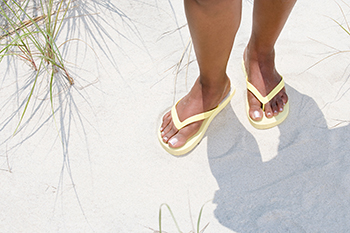
If you are a fan of flip-flops, it is essential to consider their impact on foot health. While these airy sandals are convenient, they may not be the best choice of footwear because they offer minimal arch support, heel cushioning, and shock absorption, possibly leading to foot discomfort and pain. Wearing flip-flops forces your toes to grip tightly to keep the sandals on. Over time, this can lead to conditions such as hammertoe, where toes become permanently bent. Researchers have found that flip-flops can change your natural walking pattern, potentially causing pain and problems from your feet up to your hips and lower back. The majority of flip-flops have thin soles that offer little foot protection. This can result in increased heel-strike impact and foot discomfort. Flip-flops can also increase the risk of falls and injuries due to their minimal attachment to the feet. Substitutes for flip-flops that are better for your feet should fit snugly without being too tight, provide proper arch and heel support, and have ankle straps or toe rests to prevent slipping. In general, flat-soled shoes are not ideal for foot health. If you desire the comfort and ease of flip-flops but want to protect your feet, it is suggested that you make an appointment with a podiatrist for recommendations
Flip-flops can cause a lot of problems for your feet. If you have any concerns about your feet or ankles, contact Dr. Ronald Sheppard from Warren-Watchung Podiatry Center. Our doctor will assist you with all of your foot and ankle needs.
Flip-Flops and Feet
Flip-flops have managed to become a summer essential for a lot of people. While the shoes may be stylish and easy to slip on and off, they can be dangerous to those who wear them too often. These shoes might protect you from fungal infections such as athlete’s foot, but they can also give you foot pain and sprained ankles if you trip while wearing them.
When Are They Okay to Wear?
Flip-flops should only be worn for very short periods of time. They can help protect your feet in places that are crawling with fungi, such as gym locker rooms. Athlete’s foot and plantar warts are two common fungi that flip-flops may help protect your feet against.
Why Are They Bad for My Feet?
These shoes do not offer any arch support, so they are not ideal for everyday use. They also do not provide shock absorption or heel cushioning which can be problematic for your feet. Additionally, you may suffer from glass cuts, puncture wounds, and stubbed toes since they offer little protection for your feet.
More Reasons Why They Are Bad for Your Feet
- They Slow You Down
- May Cause Blisters and Calluses
- Expose Your Feet to Bacteria
If you have any questions, please feel free to contact one of our offices located in Marlboro and Watchung, NJ . We offer the newest diagnostic and treatment technologies for all your foot care needs.
